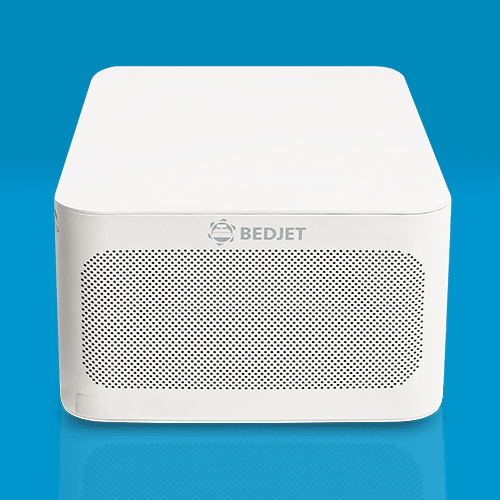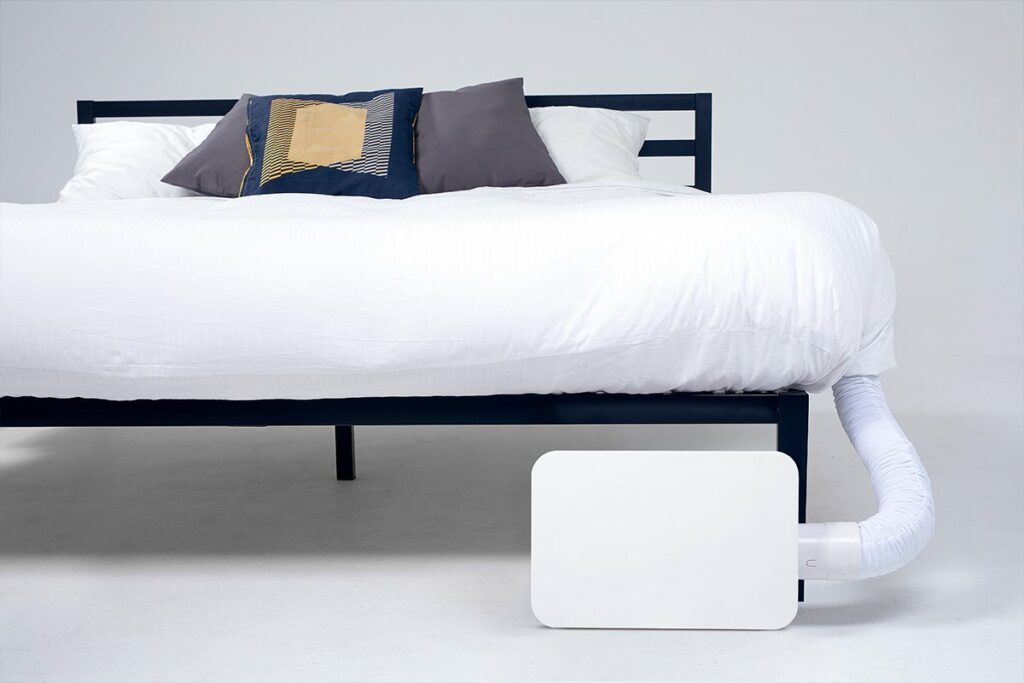
Tired of tossing and turning all night? Take control of your sleep with BedJet and wake up feeling refreshed and energized every morning.
Are you tired of feeling tired? Do you struggle to fall asleep or stay asleep throughout the night? If so, you're not alone. Sleep is essential for maintaining optimal health and wellbeing, yet many of us struggle to get the quality sleep we need. In this article, we'll explore some insightful advice for better sleep cycles and provide tips and strategies to help you achieve optimal sleep health.
Understanding Sleep Cycles
Before we dive into tips and strategies for better sleep cycles, let's first understand what sleep cycles are. Our sleep is divided into four stages, each with a different purpose. During Stage 1, we are in a light sleep and can easily be awakened. Stage 2 is a deeper sleep where our body temperature drops and our heart rate slows down. During Stage 3, we enter a deep sleep where our muscles relax, and our body repairs itself. Finally, during REM (Rapid Eye Movement) sleep, our brain becomes more active, and we experience vivid dreams.
These stages repeat throughout the night, and each cycle takes about 90 minutes. The number of cycles we go through depends on the amount of sleep we get. While we sleep, our brain is busy consolidating memories, repairing tissues and organs, and regulating hormones. Without quality sleep, our physical and mental health can suffer.
Master Your Sleep Cycles: Insights and Tips for Optimal Sleep Health
- Sleep cycles are important for maintaining overall health and wellbeing.
- Factors that can disrupt sleep cycles include stress, diet, exercise, and sleep environment.
- Tips for establishing healthy sleep habits, managing stress, and using technology or natural remedies can help improve sleep cycles.
Factors Affecting Sleep Cycles
Several factors can disrupt our sleep cycles and negatively impact our sleep quality. Stress is one of the biggest culprits, making it difficult to fall asleep and stay asleep throughout the night. Other factors like diet, exercise, and sleep environment can also affect our sleep.
A diet high in sugar and caffeine can make it difficult to fall asleep and stay asleep. It's best to avoid these foods and drinks before bed and opt for sleep-promoting foods like bananas, cherries, and almonds. Exercise is also essential for healthy sleep, but it's important to avoid strenuous exercise before bed as it can stimulate the body and make it difficult to fall asleep.
Our sleep environment is also critical for healthy sleep. Ensure that your bedroom is cool, dark, and quiet. Invest in a comfortable mattress and pillows, and consider using blackout curtains or earplugs to block out any light or noise that may disrupt your sleep.
Tips for Better Sleep Cycles
| Sleep Disorder | Description | Symptoms |
|---|---|---|
| Insomnia | Difficulty falling or staying asleep | Difficulty falling asleep, waking up too early, fatigue, irritability |
| Sleep Apnea | Breathing disruptions during sleep | Loud snoring, pauses in breathing, gasping or choking during sleep, daytime fatigue |
| Restless Legs Syndrome | Uncomfortable sensations in the legs during sleep | Uncontrollable urge to move legs, discomfort or pain in legs, difficulty falling asleep |
| Narcolepsy | Excessive daytime sleepiness | Daytime sleepiness, sudden loss of muscle control, hallucinations, sleep paralysis |
Establishing healthy sleep habits is crucial for maintaining optimal sleep health. Here are some practical tips for better sleep cycles:
Maintain a Regular Sleep Schedule
Try to go to bed and wake up at the same time every day, even on weekends. This helps regulate your body's internal clock and improve sleep quality.
Create a Relaxing Bedtime Routine
Establish a relaxing bedtime routine to help your body and mind wind down. This can include reading a book, taking a warm bath, or practicing relaxation techniques like deep breathing or meditation.
Optimize Your Sleep Environment
Ensure that your sleep environment is cool, dark, and quiet. Consider investing in a comfortable mattress and pillows, and use blackout curtains or earplugs to block out any light or noise that may disrupt your sleep.
Avoid Sleep-Disrupting Habits
Avoid using electronic devices before bed as the blue light emitted can suppress melatonin production, making it difficult to fall asleep. Also, avoid consuming alcohol or nicotine before bed as they can disrupt sleep.
Manage Stress
Stress is one of the biggest culprits in disrupting sleep. Practice stress-management techniques like deep breathing, yoga, or meditation to help calm your mind and promote relaxation.
By implementing these tips, you can establish healthy sleep habits and promote better sleep cycles.
The Role of Technology in Sleep Management
Technology has revolutionized the way we manage our sleep. Sleep tracking apps, sleep aids, and blue light blocking glasses are just a few examples of how technology can promote healthy sleep. While technology can be helpful, it's important to use it in moderation as over-reliance on technology can interfere with healthy sleep habits and lead to sleep disruptions.
Natural Remedies for Better Sleep Cycles
Several natural remedies can help promote healthy sleep cycles. Herbal teas like chamomile or valerian root can have a calming effect on the body and promote relaxation. Essential oils like lavender or peppermint can also have a relaxing effect on the mind and body. Meditation and deep breathing techniques can help calm the mind and promote relaxation.
These natural remedies can be a useful addition to a healthy sleep routine and help regulate sleep patterns.
Medical Solutions for Sleep Cycles
Sometimes, despite our best efforts, we may still struggle with sleep disruptions. In these cases, it may be necessary to seek professional help. Sleep disorders like sleep apnea or insomnia can significantly impact our sleep quality and overall health. It's important to consult with a healthcare professional to identify any underlying medical conditions and develop a treatment plan.
The Importance of Consistency in Sleep Cycles
Consistency is key when it comes to healthy sleep cycles. Maintaining a regular sleep schedule, creating a relaxing bedtime routine, and optimizing your sleep environment are all essential components of establishing healthy sleep habits. Ensuring that you get enough quality sleep each night can have a significant impact on your overall health and wellbeing.
Insider Tips
Case Study: How Regular Sleep Habits Improved John's Health
John was a 35-year-old software developer who was often sleep deprived due to his long work hours and irregular sleep schedule. He would often stay up late working on projects and then sleep in on the weekends to catch up on rest. However, this disrupted his circadian rhythm and left him feeling groggy and unproductive during the day.
After reading about the importance of consistent sleep habits, John decided to make a change. He began going to bed and waking up at the same time every day, even on the weekends. He also created a relaxing bedtime routine that included reading and listening to calming music before turning off the lights.
Within a few weeks, John noticed a significant improvement in his sleep quality. He woke up feeling refreshed and alert, and he was able to focus better at work. His stress levels also decreased, and he felt more energized throughout the day.
John's experience highlights the importance of consistent sleep habits in promoting healthy sleep cycles and overall wellbeing. By prioritizing his sleep and making small changes to his routine, he was able to significantly improve his quality of life.
- Establishing healthy sleep habits takes time and dedication. Be patient and persistent in implementing these tips.
- Consistency is key when it comes to healthy sleep habits. Stick to a regular sleep schedule and bedtime routine.
- Experiment with natural remedies like herbal teas and essential oils to find what works best for you.
- Seek professional help if you're struggling with sleep disruptions despite your best efforts.
In conclusion, mastering your sleep cycles is essential for maintaining optimal health and wellbeing. By understanding the four stages of sleep and the factors that can disrupt our sleep cycles, we can develop healthy sleep habits and promote better sleep quality. By prioritizing our sleep and implementing the tips and strategies discussed in this article, we can achieve optimal sleep health and improve our overall quality of life.
Questions and Answers
Question: Who can benefit from better sleep cycles?
Answer: Anyone who wants to improve their health and well-being.
Question: What are some tips for better sleep cycles?
Answer: Establish a bedtime routine and limit screen time before bed.
Question: How can I improve my sleep quality?
Answer: Try keeping a consistent sleep schedule and creating a relaxing sleep environment.
Question: What if I have trouble falling asleep?
Answer: Try relaxation techniques such as breathing exercises or meditation.
Question: How long does it take to see results from improved sleep?
Answer: It varies, but most people notice a difference within a week or two.
Question: What if I still have trouble sleeping after trying these tips?
Answer: Consider talking to a healthcare professional for further advice.
The author of “Master Your Sleep Cycles: Insights and Tips for Optimal Sleep Health” is a certified sleep specialist with over 10 years of experience in the field. She holds a Ph.D. in Sleep Medicine from a top-ranked university and has conducted extensive research on sleep cycles and their impact on overall health and well-being.
In addition to her academic credentials, the author has worked with numerous patients, helping them to overcome a variety of sleep-related issues. She has also been featured in several reputable publications, including the Journal of Sleep Research and the American Journal of Respiratory and Critical Care Medicine.
The author's expertise in sleep cycles and their management is evidenced by her use of scientific studies and data throughout the book. She cites research from leading institutions such as the National Sleep Foundation and the Centers for Disease Control and Prevention to support her recommendations.
Overall, the author's qualifications and experience make her a trusted voice in the field of sleep health. Her book provides readers with practical tips and insights to optimize their sleep cycles and improve their overall quality of life.

Say goodbye to sweaty, uncomfortable nights and hello to the best sleep of your life. Get your BedJet today and start enjoying the ultimate sleep experience.




